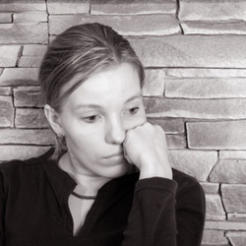Janet Street Porter's article entitled Depression? It's just the new trendy illness! sparked 358 comments and 180 complaints. A resolution of sorts was met this week but Niki May Young doesn't think it's enough.
There’s a bitter taste in my mouth that just won't go away and it’s been cooked up by sometimes-chef Janet Street Porter. You may know her as the occassional visitor to Gordon Ramsay’s kitchen but it’s her penchant for brewing up controversy that thrust her into the public eye and in May this year she let rip with an article entitled Depression? It's just the new trendy illness!
It was a brave move of the Daily Mail to endorse the prolifically radical ramblings of JSP, but it was a cruel move to endorse her distasteful ‘debate’ in which she accused sufferers of depression of simply following the latest trend. Sparking 358 comments (at last count), and 180 official complaints, mental health charity Rethink was held by the Press Complaints Commission as the chief complainant after it said that while JSP is entitled to her opinion, a number of her comments were inaccurate.
The dispute was resolved this week by the Daily Mail attaching a response to JSP's article from Rethink to the article along with the additional comments - taking at least some responsibility for its part in the saga.
But I can't help but be perturbed that JSP appears to have gotten away Scot-free. Of course, in the context of debate opinions are often contentious, as a journalist I'm all for freedom of speech. But in this case, was it really necessary, and at what price in a society that is already painfully non-responsive to the plight of those suffering from mental illness? For those unfamiliar with what she said I'll outline some of it for you.
In her description of the “misery movement”, as she calls it, JSP ignores statistics from the National Institute For Clinical Excellence which state that one in four women will require treatment for depression at some time (one in ten for men), and the Mental Health Foundation’s research which states that one in four people will experience some kind of mental health problem in the course of a year, and turns the very real issue of depression into a class war:
“If you're a black South African woman growing up in a township, or a mum in a slum favela in Rio, or a supermarket shelf-stacker in Croydon, or one of the band of low-paid female workers who go to work at 3am to clean the offices of the wealthiest and most powerful people in Britain in the City of London, you probably aren't afflicted by depression,” she says. “What you're more likely to be suffering from is poverty, exhaustion and a deficient diet. You will have bills you can't pay and a struggle to feed and clothe your kids.”
Further, she lambasts the middle class stating:
"I find something very slightly repellent about this recent epidemic of middle-class breast-beating. This tidal wave of analysis about why 'having it all' isn't what it was cracked up to be. Why daily life is a series of disappointments. Why sufferers feel empty and suicidal. Get a grip, girls!"
This heartless quip adds unnecessary brutality to her rant which assumes that it's impossible to be depressed if you are comfortable financially, reinforcing, in my opinion, one of society's greatest ailments - greed. We've all heard the saying "money can't buy you happiness", maybe JSP disagrees.
Later she states that despite the feelings of "rage and despair" following the deaths of her sister and more recently a close friend, her "life goes on". Well, seriously... well done for her. But depression is not just sparked by tragic events, very often there's no explanation at all. Not having suffered from an ailment personally is not evidence of its lack of existence or prevalence. If you were to apply this same logic to any other illness in the same token you could accuse cancer sufferers, Aids sufferers, Alzheimers victims of making it all up had you not suffered the illnesses yourself. JSP appears to be making the all-too-common faux pas of assuming that mental illness is not as definite as physical illness, the same ill-conceived logic that mental health charities have strived for years to reverse.
I’m not from a particularly well-to-do family - my mother was a midwife, my father a social worker - but we were comfortable enough. Yet I grew up, unknowingly, in a family of depressives. It was not until I was in my late teens that I was confronted with the extent that the illness runs through my family and discovered that a close relative had been suffering and medicated for well over a decade, in silence. She wasn’t the only one. At one point, she stopped taking her medication and within six months she tried to take her life. According to the World Health Organisation 850,000 people take their own lives each year because they are depressed.
Depression is not a class issue. It is a very real, very painful, chronic illness which can deeply affect people of any age, class, race, gender or profession. Yes, some determined people are able to pull themselves through and find the light at the end of the tunnel. But others, sadly, can’t.
JSP’s attempt to spur debate made a mockery of the tireless work undertaken by charities like Rethink, Mind, the Mental Health Foundation, SANE… to ensure that depression and other mental illnesses are taken seriously. There is no “depression bandwagon” for you to “laugh out loud” at, Janet. A wise man once told me: “A loud laugh bespeaks a vacant mind.” At present, I’m inclined to agree. As far as I'm aware JSP has made no personal apology for the damaging comments she has made. I think the wannabe chef should cook up some humble pie and take a big bite.
Niki May Young is website editor at Civil Society









